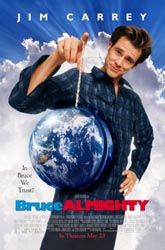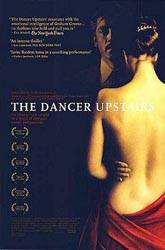 Director: Starring: Release: 23 May 03
|
Bruce Almighty BY: DAVID PERRY There was a time -- not too long ago, mind you -- when Jim Carrey was seen as little more than another fly-by-night funnyman without any credit in any other capacity. Coming off of his time as the white guy of In Living Color, Carrey took a slew of films built on his physical humor over anything that might seem human. Sometimes his flamboyancy worked perfectly (In Living Color, Dumb and Dumber), sometimes it did not (the Ace Ventura films, The Mask), and all the while he was making millions. The Cable Guy was a big step for him, taking a gamble that his normal audience when accept him in a dark, strange role that involved something more than tagline throwing (though, that film included his honorific intonation of other people’s taglines). And now he is Jim Carrey, The Actor. Films like The Truman Show, The Man on the Moon, and The Majestic have shown his abilities in drama even if it hasn’t necessarily created the aura of respectability that the actor might have been going for. In many people’s minds, Carrey is still The Comedian above all else, and whatever he may do (his next film is the latest screenplay by Charlie Kaufman), is doubtful to change that as long as he is still placating to his ticket-buying base with such regressive films as Me, Myself & Irene, How the Grinch Stole Christmas, and Bruce Almighty. In the latter film by Tom Shadyac, Carrey plays Bruce Nolan, a Buffalo, New York, television news reporter constantly shat upon by his network. When Bruce has finally had enough as his prized anchorman position is given to the sniveling brownnoser Evan Baxter (Carell), he chastises God for the predicament his creator has put him in. Called to a office building after hours, he finds God waiting to give his powers to Bruce, let someone questioning him try the position out for himself. This premise should open up the film to hilarity or at least some level of theological questions that have worked perfectly on films like Michael Powell’s woefully forgotten Stairway to Heaven. Instead, the entire film is built on such unfunny gags as (a) what if Bruce made his increased the breast size of his wife (Aniston), (b) how about he makes the dog use the toilet, (c) and maybe he’d part a sea of gawkerblocker cars. There’s nary a laugh amid the collection of all-powerful man jokes that somehow made it into the screenplay by Steve Koren, Mark O’Keefe, and Steve Oedekerk (who does not deserve to have a similar name to Bob Odenkirk of Mr. Show). If there was any inspiration present in the film, it would be gum-drop sickening religiosity quagmire that the film ultimately falls into. The final third of the film, which has the sound of a bad Pete Yorn CD and the sloppy sentiment of a Seventh Heaven episode, worked better as the dedication from one of the radio Delilah programs than as a film that previously lifted itself to what it considered to be edgy comedy. Considering the so-called pedigree that made this film, though, it comes as no surprise that Bruce Almighty ultimately proves to be the familiar tripe of the year, the film with high aspirations of laughs and low output. This is, after all, the same director-writer (Oedekerk) team who made Ace Ventura: Pet Detective and the completely unforgivable Patch Adams. My choice for the worst film of last year, Dragonfly, was the wretched creation of Tom Shadyac. The clearest lesson that
came from Bruce Almighty among all the life lessons it tries to impart is
that there is no longer even the hint of a place for Carrey in these types
of roles. He has moved on to the darker parts and whenever he tries to
return to levity he overcompensates by destroying the fabrics of the
jester’s clothing he previously wore. It is telling that the film’s funniest
moment isn’t even his: it comes when Steve Carell, one of the best alumni
from The Daily Show with Jon Stewart, manically steals the show with an
apparently improvised outburst of unintelligible furor. Carell is the new
Jim Carrey, and the old guy will just have to settle with the darker works.
If he plays his cards right, Carrey might even get that coveted Oscar too --
just look at Jack Lemmon’s career. |
|
| ©2003, David Perry, Cinema-Scene.com, 23 May 2003 | ||




